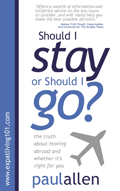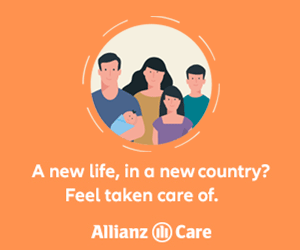Expat Life: Giving Birth Abroad
By Paul Allen
Summary: Paul Allen shares he and his wife's experiences having babies abroad.
My youngest daughter has just celebrated her birthday. These are wondrous moments in a child’s life – the excitement on her face as she peeled away the wrapping paper on her presents, the delight as the cake came through with its flickering candles, the knowledge that on this special day the world revolved around her.
But while the attention inevitably centers on the birthday boy or girl, I feel such occasions should be a celebration for the mothers as well. After all, it is they who go through the birthing process in the first place. And the run up to our daughter’s arrival had been a particularly anxious time.
Spanish Experience
Both our girls were born in Spain. However, the experience with our first child had left us both impressed and troubled by the Spanish health care system.
The antenatal care had been good, albeit under the ministrations of an unsympathetic gynecologist. The clean and efficient post-natal care in the hospital was excellent. Unfortunately, the birth itself was brutal.
In the UK, from whence we came, the trend for many years has been towards the most natural births possible. Women are encouraged to move around, to find positions most comfortable for them, to use inflatable balls as support aids, and make use of birthing pools where available.
In Spain, by contrast, medical interventionism remains much more the order of the day. In our local hospital they had never heard of gas and air at the time of our first daughter’s birth, nor the TENS (Transcutaneous Electrical Nerve Stimulator) machine we brought over from the UK. Instead the pain relief options consisted of an epidural or nothing.
As for the labor, it was in a subterranean bunker, conducted flat on the bed through the first stage, then feet in stirrups for the actual delivery. The upshot was a long and difficult delivery.
Family Support
With these memories in mind my wife was understandably nervous at the prospect of a repeat performance. It was made worse by the uncertainty of whether I would be there to support her.
For us, it highlighted one of the major problems of living in a foreign country, away from the support network an extended family can offer. We were hoping my wife’s parents could come over for the birth, so they could care for our eldest daughter. However, my mother-in-law had developed a severe back problem and wasn’t sure if she could travel.
There was also the question of when they should come. If their flights were booked to arrive too early they might have to return to the UK during those first crucial days after the birth, when the extra hands would be invaluable. Leave it too late and they risked missing the birth altogether.
And if they didn’t arrive in time, I would have no choice but to stay home to look after our eldest daughter, leaving my wife to go to hospital and give birth alone. Not an appealing thought. Since she was already being monitored for dangerously high blood pressure she could have done without the additional stress.
Natural Processes
In the end, thankfully, everything turned out better than we could have hoped. My in-laws arrived several days before the big event, which left me free to accompany my wife in the knowledge our eldest daughter was in good hands. Plus we opted to have the birth in a different hospital, in the nearby city of Girona, where there was more of a midwife-led process.
It meant my wife was given the freedom to move around during the early stages of labor, and thus spent the first three hours rocking back and forth on an inflatable ball, using the TENS machine to help with the pain – which our midwife had heard of this time.
The hospital still had no birthing pool, but at least there was a bath. Unfortunately, there was only one, so my wife had to wait for the previous occupant to get out before she could use it!
Nevertheless, within five minutes of being in the water she was at the pushing stage, and less than half an hour later our daughter was born. No drugs, no stirrups, no obstetric intervention. OK, it still hurt like hell, but it was a much more positive experience.
Postnatal Benefits
Yet while such mother-centric, midwife-led practices have evolved in this hospital, they remain unusual in Spain. On the flip side, the postnatal care we experienced with both births in the different hospitals was exemplary. The rooms, which are shared with another mother, were light and comfortable, with an en-suite toilet/shower. Partners are also allowed to remain with the mother and baby throughout the duration of their stay.
Compare that to the UK, where fathers are turned out at the end of visiting hours, leaving the mother – who is exhausted, in pain and quite possibly stitched and hooked up to a drip – to take on sole responsibility for their newborn child, who may spend the night screaming.
And on both occasions as we left the hospital to take our precious bundles home a cleaner came in to strip the rooms and give everything in them a thorough disinfecting. Now that was a welcome sight.
Whether we would want to go through it all again though is another matter!
About the Author
 Paul Allen is the author of "Should I Stay Or Should I Go? The Truth About Moving Abroad And Whether It's Right For You," the definitive guide for anyone considering a life overseas.
Paul Allen is the author of "Should I Stay Or Should I Go? The Truth About Moving Abroad And Whether It's Right For You," the definitive guide for anyone considering a life overseas.
Paul is a freelance journalist and writer. Having left his native England to live and work in New York City as managing editor with a leading financial publisher, Paul then swapped city life for the beauty of north-eastern Spain in 2003.
Spurred by the "lucky you" comments of colleagues and friends, who seemed under the impression that life overseas was one long fiesta, Paul took up the challenge of revealing both the bright and dark sides to living abroad, hoping it would help people better decide if they too should make the move. And so his book was born.
To get Paul's book, and for more information and advice on the pros and cons of moving abroad, visit his website at http://www.expatliving101.com/.
First Published: Jun 13, 2010


